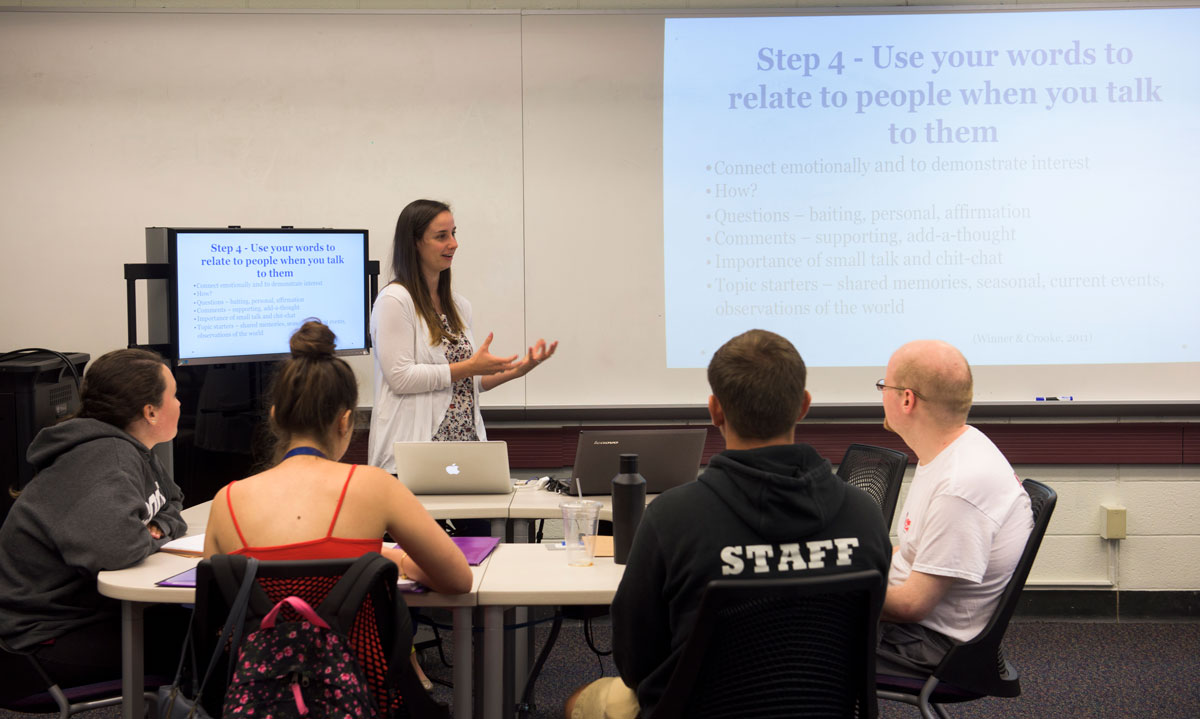Taking your first college class can be daunting, but really, any kind of new social experience might be enough to make even the most seasoned of students pull inside their shell. Barbara Cook, assistant professor of communication disorders, says that everyone faces challenges with communication, and with this thought in mind, she and Deborah Weiss, professor and chair of communication disorders, created a course called “Fundamentals of Social Communication,” which they taught for the third time this summer. Three communication disorders graduate students – Aideen Hanion, Hailey Jacobs, and Katerina Marlin — assisted with the class.
The course is unique in that it represents a partnership between Southern and Chapel Haven’s Asperger Syndrome Adult Transition Program. While the course is open to anyone, the class comprises university students interested in communication disorders and adults with disabilities who live at or take day programs at Chapel Haven, an award-winning, nationally accredited school and transition program in New Haven that serves over 250 adults with a variety of abilities and needs.
“The course title is reflective of its content,” says Cook. “We named it strategically.” The course is based on a theory of how people use their cognitive ability to be good at social communication. For the students from Chapel Haven, Cook and Weiss thought it would be helpful to take a class with students who have cognitive ability and to have the content of that class teach about social communication. Cook said the course covers social cognition and brain processes involved in social communication.
Weiss added that she and Cook worked to develop a course that would be academically challenging for all students while also taking into consideration the needs of students who are having their first taste of college. The course really has something for everyone: the advantages of the course to communication disorders students, say Cook and Weiss, are that it is an elective introductory course in social cognition and communication that is useful personally and professionally, and that it provides a greater depth of knowledge in social cognition and communication.
Advantages of the course to Chapel Haven students are that it’s a first college or university experience and the first time on the SCSU campus for most, and they are learning on an academic level about content that poses personal challenges.
In the course, all students have the opportunity to expand personal and group communication skills through daily interaction with classmates during planned team-based activities. Students also gain a broader perspective on social interaction strengths and challenges faced by their peers.
The response from communication disorders students who have taken it has been overwhelmingly positive, says Weiss. Chapel Haven students are also pleased with their experience in the class. One of these students, a young woman named Bethany, said this was her first college class and she was “happy about getting some college experience.” She added that she liked learning about the ways people with special needs communicate and how they learn to communicate.
In one class session, discussion focused on using one’s body to establish a physical presence. The students talked about respecting personal space, how to enter a group, approach a group, or pop into a group for brief conversation. They discussed eye contact and why it’s important when communicating with another person. These elements of social interaction might come naturally to some people but not others, and the class analyzed the behaviors to understand their role in communicating.
The students agreed that they can use what they learn in the course not only in their college careers but also in work settings, because becoming a better communicator is a skill from which everyone can benefit.


